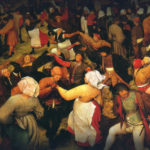We run our website the way we wished the whole internet worked: we provide high quality original content with no ads. We are funded solely by your direct support. Please consider supporting this project.

The Kingdom of God (Part 2)
The Church is called to be nothing less than “the body of Christ,” a sort of corporate extension of Jesus’ incarnate body. We are called to replicate who Jesus was by manifesting who Jesus is. And this is how we expand the dome in which God is king—the Kingdom of God.
By definition, therefore, the Kingdom looks like Jesus. This is its essence. And we participate in this Kingdom to the extent—and only to the extent—that we look like Jesus.
This is why the New Testament places so much emphasis on imitating Jesus. For example, Paul commands the Ephesians, “Be imitators of God.” He then explains exactly what he means when he adds, “Live in love, as Christ loved us and gave his life for us” (Eph 5:1-2). Think seriously about this. We are called to do nothing less than imitate God. This is just what it means to be “godly,” or god-like. The Greek word for “imitate” means “to mimic” “mime” or “shadow” someone else. We are thus to be the shadow that Jesus’ casts. A shadow never does anything that the one casting it does not do. So too, we are to do exactly what we have seen God do in Jesus Christ. We are to love as Christ loved us on Calvary: nothing more and nothing less.
Paul stresses that Calvary-quality love is something we’re called to live in. Love isn’t something we’re supposed to do occasionally, when it’s convenient, when we’re in the mood or when we already like the other person. Rather, Calvary-quality love is to be woven into the very fabric of our life—our breath, our brain waves and our heart beat. The time you’re called to love is when you’re breathing, when you’re conscious, when your heart is beating.
The apostle John teaches essentially the same thing when he defines love as “Jesus Christ [laying] down his life for us.” He then adds that for this reason, “we ought to lay down our lives for our brothers and sisters” (I Jn 3:16). We are called to love, which means we are to replicate Calvary toward others.
This love we are called to live in isn’t something sentimental or abstract: it always takes the form of action—as God’s love did on Calvary. And this is why John immediately provides us with a concrete illustration of this love.
If anyone has material possessions and sees his brother in need but has no pity on him, how can the love of God be in him? Dear children, let us not love with words or tongue but with actions and in truth” (I Jn 3:17-18).
This is the Kingdom of God. In fact, this is the definition of “Christian,” for this looks like Jesus Christ. It’s not primarily about thinking and saying the right things—“the correct doctrine” as so many insist. It’s about doing Jesus-like things. It’s about Calvary-quality ACTION. It’s about sacrificing to meet a need when you see it. It’s about mimicking Christ with every breath, brainwave and heart beat.
Because we are called to love like Christ loved us, we are to love without any regard for whether we think they deserve it or not. Common sense must never be allowed to trump the love we’re called to give. Thus Jesus teaches us:
Love your enemies, do good to those who hate you, bless those who curse you, pray for those who mistreat you. … love your enemies, do good to them, and lend to them without expecting to get anything back…. Be merciful, just as your Father is merciful (Luke 6:27-28, 35-36).
This is what Calvary-quality love looks like and this, by definition, is what the Kingdom of God looks like. We are to be merciful, just as the Father has been merciful to us—unconditionally and indiscriminately.
Image by Rickydavid via Flickr
Category: General
Tags: Action, Enemy Love, Jesus, Kingdom Living, Self-Sacrificial Love
Topics: Following Jesus
Related Reading

The Worst Heresy That Never Got Anyone Burned at the Stake
According to John’s Gospel, on the evening of his crucifixion Jesus clearly articulated the single-most important quality by which his followers would be recognized: “By this all men will know that you are my disciples, if you love (agape) one another” (John 13:35). Or again: “But I tell you, love your enemies and pray for…

Jesus and the “Eye for an Eye” Command: A Response to Paul Copan (#10)
As I noted in my 9th response to Paul Copan’s critique of Crucifixion of the Warrior God (CWG), Copan argues that Jesus merely repudiated wrong applications of OT laws in his sermon on the mount, not any OT law itself. He thus thinks I’m mistaken when I argue that Jesus placed his own authority above…

Jesus: Our Vision of God
At the beginning of his Gospel John taught that “no one has ever seen God, but the one and only Son, who is himself God and is in closest relationship with the Father, has made him known” (Jn 1:18). He is claiming that, outside of Christ, no one has ever truly known God. In the…

Loving Enemies in the Day of ISIS
The following excerpt from Myth of a Christian Religion discusses Jesus’ command to “turn the other cheek.” Whatever our response to the persecution of Christians in the world, we must take this passage seriously. While this excerpt does not tell us exactly how to respond, it can be used to shape our attitude and stance…

Can you have an Anabaptist Mega-Church?
Several times over the last few years I’ve heard statements like this: “Boyd may embrace an Anabaptist theology, but his church (Woodland Hills) cannot be, by definition, an Anabaptist church because an Anabaptist church can’t be a mega-church.” I’ve heard similar things about our sister church, The Meeting House, in Toronto Canada. The reasoning behind these…

Trapped in a Constantinian Paradigm
A Response to James Smith’s Review of The Myth of a Christian Nation In my book The Myth of a Christian Nation I repeatedly call on Christians to engage in social activism. Followers of Jesus are called to be revolutionaries, I argue, meaning that we are to revolt against the status quo insofar as the…
